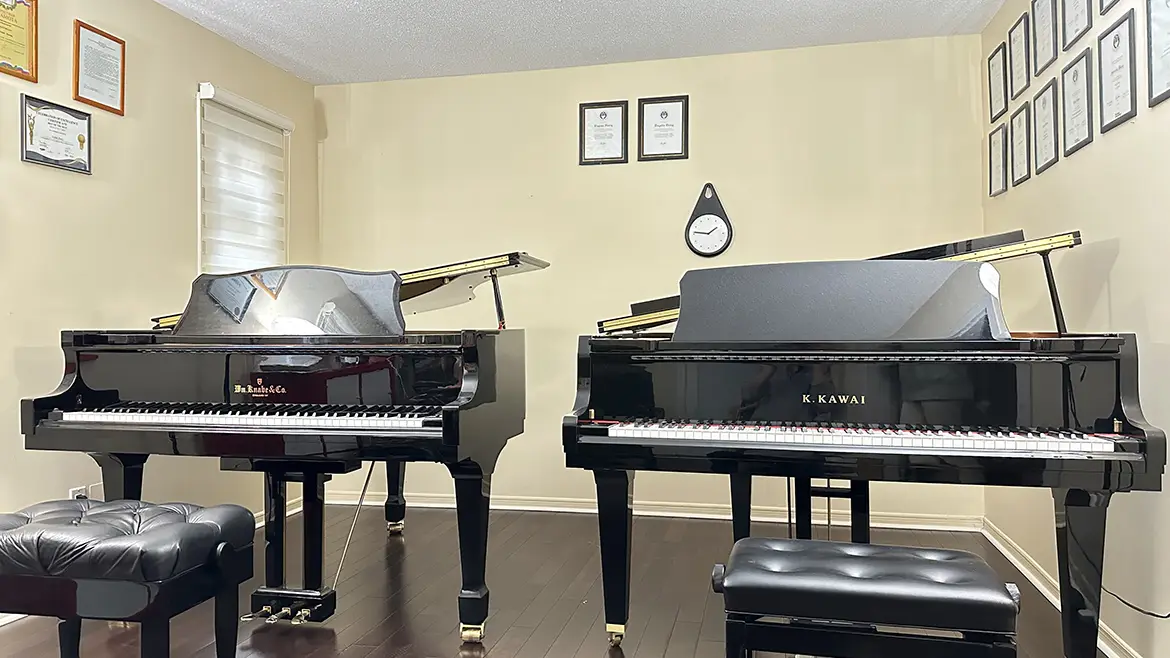

COVID-19 UPDATE
Sophia's Piano Lessons doesn't have to stop you from playing and enjoying music. I offer ONLINE Piano Lessons which work very well, especially during COVID-19 restrictions. All you need is a mobile phone or webcam on your computer or laptop and you are set! Just like a video call to your friends of family!
Want to see our online course achievements? click here for detailed.
Contact Sophia at 416-885-8388 for more info.


Sophia's Piano Lessons applies a holistic curriculum to many of its courses, including beginner piano lessons. This involves integrating the standard requirements commonly found in exam systems like the RCM (Technique, Ear Training, Repertoire, Etude, Sight Reading) together with other commonly accepted areas of musical literacy.
All levels of private piano study taught at Sophia's Piano Lessons will receive training in the following nine areas of study:
Students at all levels will be given a selection of repertoire from multiple eras of music (Baroque, Classical, Romantic, Modern, Pop, Jazz, Blues) to study and perfect.
Students are taught a wide range of technical rudiments. Each level of the Sophia's Piano Lessons Curriculum has an increasing difficulty rating for these rudiments. Generally, they include: scales, arpeggios, broken triad and Dominant, Diminished 7th chords shapes.
Students are taught to recognize melodies, intervals, and chords by ear. This significantly aids in the speed of repertoire learning, as well as enhances the memorization process, and creates a greater versatility in ensemble or band settings.
Students at every level are taught to recognize and play in real-time: individual notes, chords, melodic passages, and full two-clef writing
Music is increasingly created with, and enjoyed through technology. Students are given the opportunity to connect with modern music technology as a part of most performances, as well as the classroom learning environment. Technology is presented as a tool to further their explorations of rhythm, composition, and improvisation.
This approach treats the study of harmonic progression as directly connected with the study of performance, rather than a separate academic approach not connected with performance. Students learn to understand the harmonic motion of the pieces they are playing, increasing their depth of understanding and interpretation of those pieces. It also gives them an advanced understanding of how harmony influences improvisation and composition.
Studying rhythm in an applied sense vs. isolated requirements will increase students’ capacity for contemporary playing, as well as a stronger sense of pulse across all genres of music. It also encourages the use of rhythm as a compositional and improvisational component.
As young as 4 years old, students begin the process of crafting their own melodies and basic harmonic progressions. It is the musical equivalent of young school students writing their own short stories. It provides an outlet for early creative thoughts, and reinforces the relevance of the skill build for students. There are several opportunities throughout the year to perform and share these compositions.
Students will learn how to compose melodies and rhythms in real-time (often referred to as improvising) across multiple genres. Like composition, improvisation increases the number of situations and opportunities that students can apply their knowledge, and creates conversational-type application of the musical language.